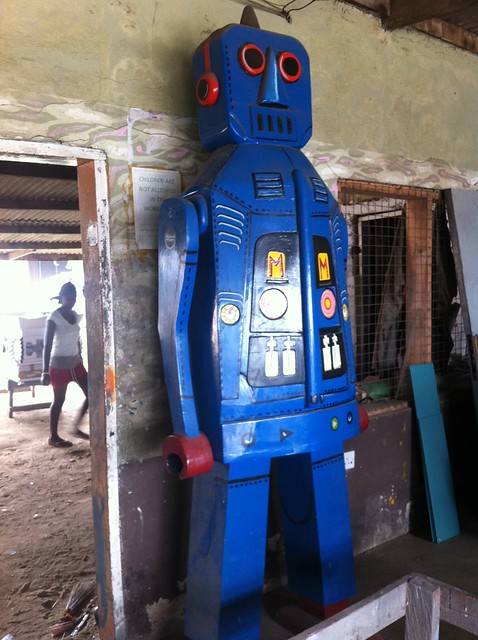What describes your life? Is it a camera? A football? Maybe a plane? I have a hard time picking an object that sums up my life, but some people have the perfect idea in mind.
That is where Paa Joe from the Ga tribe in coastal Ghana comes in. Unlike modern Americans, people in Ghana celebrate death and commonly commemorate it with elaborate and unique coffins. The living aim to honor their dead with coffins that represent their legacy. Paa Joe, after almost five decades in the business, now works with his son to handcraft these highly sought after caskets. His son explains that their coffins
“remind people that life continues after death, that when someone dies they will go on in the afterlife, so it is important that they go in style.”
Ghanian families and surrounding community members place much value on showcasing the part that contemporary African art plays life and death. They strongly believe that the dead must be buried in something that represents the role they played while alive, in order to remember where they come from and what they have left behind as they move into the afterlife. Although these handmade coffins can cost upwards of $15,000, people of the Ga tribe believe that it is more honorable to live in lifelong debt because of the burial ceremony than it is to cut the costs of a proper funeral. In conjunction with the idea that the funeral is the culmination of all life events, it is extremely vital to allocate all resources to executing this ritual in the proper fashion.
I find it very interesting that although the casket appearance is intended to encapsulate someone’s entire life, the people within the casket actually have no say in deciding what that object will be. Family and friends are tasked with the job of determining what they commission Paa Joe to create. What object will a part time fisherman, talented artist, soccer-loving father be placed in?
Reducing a person to the representation of a singular object goes hand in hand with the impersonal nature of the cadaver. The cadaver may symbolize the person and the life they once had, but in itself is bereft of any form of personhood. Memories and stories take the place of the body in terms of remembering who the person was and what they were like. These exquisite coffins are by all means quite impressive, but many could argue that they are unnecessary. After 3-4 days of public display, they are lowered six feet under the ground and are never seen again. Culturally they still uphold values of social order and religion, but physically they play a minimal role in the end of life.
All things considered, would you want to be buried in a fantasy coffin, and if so…what would it be?
For more information and pictures, click here or watch this short clip.
References
https://www.npr.org/templates/story/story.php?storyId=4496430
https://www.theguardian.com/world/2016/nov/24/paa-joe-ghana-fantasy-coffin-artist-casket-funeral
https://www.cnn.com/2016/10/14/africa/gallery/ghana-coffins-mpa/index.html


